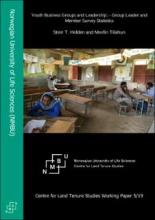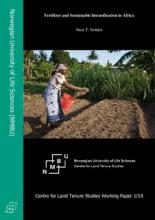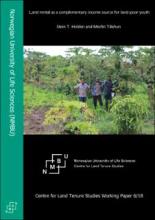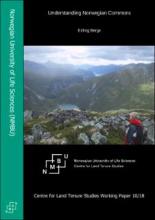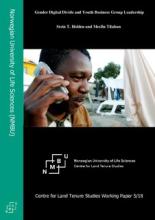Land Library
Welcome to the Land Portal Library. Explore our vast collection of open-access resources (over 74,000) including reports, journal articles, research papers, peer-reviewed publications, legal documents, videos and much more.
/ library resources
Showing items 19 through 27 of 352.This working paper is an output from the research project “Youth Business Groups for Sustainable Development: Lessons from the Ethiopian Model” that is funded by Research Council of Norway under the NORGLOBAL2 research program for the period 2019-2022.
Fiona Littlejohn - Oficial de Asuntos Ambientales de la División de Desarrollo Sostenible de la Comisión Económica para América Latina y el Caribe (CEPAL) habla sobre el ODS 11.
David Barrio - Oficial de Asuntos Económicos de la División de Desarrollo Sostenible y Asentamientos Humanos de la Comisión Económica para América Latina y el Caribe (CEPAL) habla sobre el ODS 15.
Con la Declaración de Quito sobre “Ciudades y Asentamientos Humanos Sostenibles para Todos” reconocida como la Nueva Agenda Urbana (NAU), inicia la tarea de la implementación del Plan de Acción Regional 2016-2036 (PAR) que han definido los países de América Latina a través de los Ministerios de U
Recientemente se ha constituido una agenda urbana de desarrollo sostenible que tiene como fundamentos los diagnósticos y compromisos asumidos en diversos acuerdos internacionales que han tenido lugar en los últimos años.
The paper investigates the important role of fertilizer to enhance sustainable intensification and food security in Sub-Saharan Africa based on a multi-disciplinary literature review.
Continued high population growth in already densely populated rural areas in parts of Sub-Saharan Africa makes it harder for youth to choose agriculture as their main source of income. We investigate whether near landless youth can still access rented land as a complementary source of income.
The paper reviews the development of the legal status of Norwegian commons from the first known legislation on commons. The development can be divided into 5 periods.
We assess the gender difference in mobile phone ownership among youth business group members, and how it affects election into leadership and group board positions in recently established rural youth business groups in northern Ethiopia.

